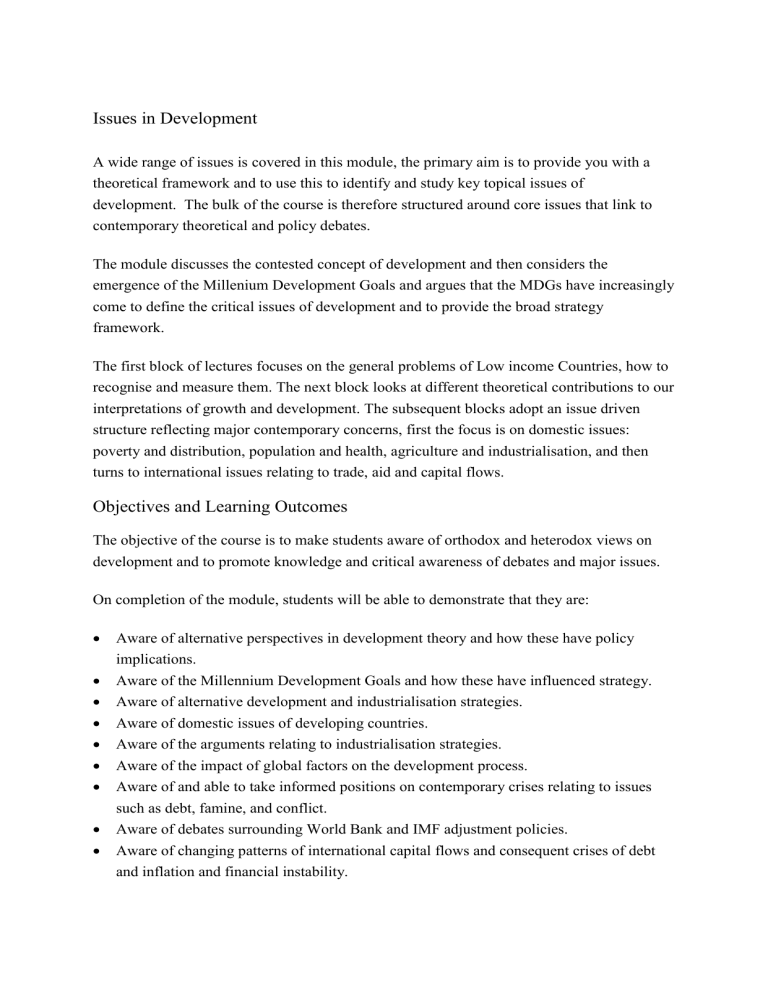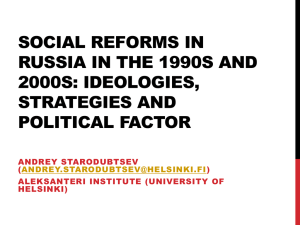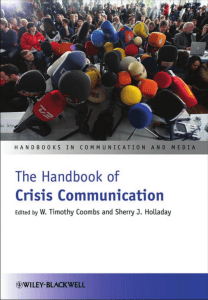
Issues in Development A wide range of issues is covered in this module, the primary aim is to provide you with a theoretical framework and to use this to identify and study key topical issues of development. The bulk of the course is therefore structured around core issues that link to contemporary theoretical and policy debates. The module discusses the contested concept of development and then considers the emergence of the Millenium Development Goals and argues that the MDGs have increasingly come to define the critical issues of development and to provide the broad strategy framework. The first block of lectures focuses on the general problems of Low income Countries, how to recognise and measure them. The next block looks at different theoretical contributions to our interpretations of growth and development. The subsequent blocks adopt an issue driven structure reflecting major contemporary concerns, first the focus is on domestic issues: poverty and distribution, population and health, agriculture and industrialisation, and then turns to international issues relating to trade, aid and capital flows. Objectives and Learning Outcomes The objective of the course is to make students aware of orthodox and heterodox views on development and to promote knowledge and critical awareness of debates and major issues. On completion of the module, students will be able to demonstrate that they are: Aware of alternative perspectives in development theory and how these have policy implications. Aware of the Millennium Development Goals and how these have influenced strategy. Aware of alternative development and industrialisation strategies. Aware of domestic issues of developing countries. Aware of the arguments relating to industrialisation strategies. Aware of the impact of global factors on the development process. Aware of and able to take informed positions on contemporary crises relating to issues such as debt, famine, and conflict. Aware of debates surrounding World Bank and IMF adjustment policies. Aware of changing patterns of international capital flows and consequent crises of debt and inflation and financial instability. Teaching Course lecturer: Tony Conibear. Lecture/Seminar format on Wednesday Evenings 6.00-9.00pm. Reading Week: Wednesday November Assessment: 80% of the final course mark is based on a 3-hour exam in June, while the other 20% of the mark is based on take-home, exam-style essays completed over the Christmas vacation. Take-home assignments; these require completion of two short essays – 1000 words each, contributing 20% to the final course grade. Assignment essays must be returned to the administrator on the date stated on the paper, failure to do so will result in penalties. The examination in June requires students to answer three questions. Recommended Reading The course covers a range of theories as well as contemporary debates on particular issues. The broad remit means that a single textbook does not adequately cover all the topics. Core texts: Todaro, M. (2015): Economic Development. 12th edition. London: Addison Wesley (a useful background discussion on most issues) Nafziger, E (2012): Economic Development. 5th edition. London: Cambridge University Press. Meier, G. and Rauch, J.E. (2005). Leading Issues in Economic Development, 8th ed, Oxford University Press, USA Thirlwall, A. P. (2011) Economics of Development, Palgrave Macmillan; 9th ed. Palgrave Macmillan. Other frequently referenced texts from the reading list: Chang, Ha-Joon, Grabel, I. (2014): Reclaiming Development. 2nd edition. Zed Books Cypher, J. (2014): The Process of Economic Development. 4th ed. London and New York: Routledge Desai, V. and Potter, R. (2014): The Companion to Development Studies. 3rd ed. (London, Routledge). Hopper, P. (2012): Understanding Development. Polity Press Kingsbury, D. et al (2016): International Development: Issues and Challenges. 3rd ed. (Palgrave). Secondi, G. (2008): Development Economics Reader. Routledge A useful reference website is: www.eldis.org. This is a portal to many development sites. Oxfam also provides useful publications and briefings on development crises. Also useful is: V. Padayachee (2010): The Political Economy of Africa. Todaro has probably the best overall coverage, but should be supplemented with other readings. I will also supplement the reading with other media available through Moodle. Reference to the above texts in the sections below will simply use the author name. Lecture topics 1. 2. 3. 4. Debates in Development: Concept and Performance. Development Poverty and Inequality: Measurement and Issues. Perspectives on Development: Growth and Structural Change. Urbanisation, Migration and Agriculture. 5. Financial Resources and Development. 6. Population, Human Capital and Health: Challenges for the MDGs. 7. Policy, Governance, Markets and Development. 8. Food: Crises, Famines and Sustainability. 9. Trade, Industrialisation and Development. 10. International Financial Flows: Globalisation and Shocks. 11. Debt, Financial Crises and the Developing World. 1. Debates in Development: Concept and Performance. Todaro: ch 1 and 2 Meier: part I Thirlwall: ch 1 and 2 Nafziger: ch 2 and 3 Hopper: Introduction Cypher: ch 1 2. Development Poverty and Inequality: Measurement and Issues. Todaro: ch 5 Meier: part VIII Thirlwall: ch 3 Nafziger: ch 6 Hopper: Introduction Cypher: ch 2 and 3 Kingsbury: ch 8 Secondi: ch 13 and 15 3. Perspectives on Development: Growth and Structural Change. Todaro: ch 3 Meier: part IV Thirlwall: ch 3, 5 and 6 Nafziger: ch 3 and 5 Hopper: ch1 Cypher: ch 4, 5 ,6 and 8 Kingsbury: ch 5 4. Urbanisation, Migration and Agriculture. Todaro: ch 7 and 9 Meier: parts VI and VIII Thirlwall: ch 6 Nafziger: ch 7 and 9 Hopper: ch1 Cypher: ch 5 and 11 Padayachee: ch 10, 11 and 20 5. Financial Resources and Development. Todaro: ch 15 Meier: part III Thirlwall: ch 13 Nafziger: ch 11 Secondi: Section 6 6. Population, Human Capital and Health: Challenges for the MDGs. Todaro: ch 6 and 8 Meier: parts V Nafziger: ch 8 and 10 Hopper: ch 3 and 4 Cypher: ch 12 7. Policy, Governance, Markets and Development. Todaro: ch 11 Meier: parts IX and X Thirlwall: ch 13 8. Food: Crises, Famines and Sustainability. Todaro: ch 10 and 9 Nafziger: ch 13 Hopper: ch 9 Kingsbury ch 11. De Waal, A (2005) : Famines that kill. De Waal, A (1990): A reassessment of Entitlement Theory in the light of recent Famines in Africa. Development and Change 21, 3 pp469-490. De Waal and Whiteside, (2003): New Variant Famines: AIDS and food Crises. Lancet no 362. ODI Briefing Paper (2008) no 37, ‘Rising Food Prices: a global crisis.’ ODI Briefing Paper (2009) no 50 ‘HIV and Emergencies.’ Oxfam Briefing Papers: various 9. Trade, Industrialisation and Development. Todaro: ch 12 Meier: parts IV Thirlwall: ch 15 Nafziger: ch 17 and 9 Cypher: ch 6, 9, 10 and 14 Sen, A (2005): ‘International Trade Theory and Policy: What is left of the Free Trade Paradigm?’ International Journal of Development Issues. 10. International Financial Flows: Globalisation and Shocks. Todaro: ch 14 and 15 Meier: parts III and IV Thirlwall: ch 14 Nafziger: ch 15 Cypher: ch 16 Hopper: ch 8 Kingsbury: ch 3 Secondi : Section 7 Kaltenbrunner, A (2009): Brazil in the Global Financial Crisis.’ Development Viewpoint no 42. 11. Debt, Financial Crises and the Developing World. Todaro: ch 13 and 14 Meier: parts III Thirlwall: ch 14 and 16 Nafziger: ch 16 Cypher: ch 16 and 17 Hopper: ch 8 Kingsbury: ch 3 Secondi : Section 8

